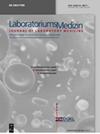凝血因子XIII (Val34Leu)多态性对伊朗阿塞拜疆妇女复发性妊娠丢失的影响
IF 0.1
Q4 OTORHINOLARYNGOLOGY
Laboratoriumsmedizin-Journal of Laboratory Medicine
Pub Date : 2017-04-25
DOI:10.1515/labmed-2017-0012
引用次数: 15
摘要
背景:复发性妊娠丢失(RPL)是一种异质性疾病,包括妊娠20周之前发生的两次或两次以上连续流产。其中一个凝血因子基因编码因子XIII (FXIII),它参与纤维蛋白的形成。FXIII基因中最常见的多态性是fxiiiia基因外显子2 (val34leu)上G向T的转化,导致缬氨酸被亮氨酸取代。本研究的目的是调查伊朗阿塞拜疆妇女样本人群中RPL和FXIII val34leu多态性之间的关系。方法:对310例RPL患者和290名健康对照者进行前瞻性病例对照研究。从全血中提取DNA,用聚合酶链反应(PCR)扩增Val34Leu多态性片段,并进行DNA测序。使用Sequenom MassArray系统进行基因分型。结果:病例组FXIII基因型频率分别为60.64% GG、34.83% GT和4.41% TT,对照组FXIII基因型频率分别为58.96% GG、36.5% GT和4.48% TT。病例组和对照组的T等位基因频率分别为78.06%和21.93%,G等位基因频率分别为77.24%和22.75%。结论:在伊朗阿塞拜疆妇女中,Val34Leu多态性与RPL之间没有明显的关联。本文章由计算机程序翻译,如有差异,请以英文原文为准。
Effects of coagulation factor XIII (Val34Leu) polymorphism on recurrent pregnancy loss in Iranian Azeri women
Abstract Background: Recurrent pregnancy loss (RPL) is a heterogeneous condition consisting of two or more consecutive abortions occurring before 20 weeks of gestation. One of the clotting factor genes encodes factor XIII (FXIII), which is involved in fibrin formation. The most common polymorphism in the FXIII genes is the conversion of G to T in exon 2 (val34leu) of the FXIIIA gene, which leads to the substitution of valine with leucine. The objective of this study was to investigate the association between RPL and FXIII val34leu polymorphisms in a sample population of Iranian Azeri women. Methods: A prospective case-control study was performed on a cohort of 310 RPL patients and 290 healthy controls. DNA was extracted from the whole blood and fragments of the Val34Leu polymorphism were amplified by polymerase chain reaction (PCR), followed by DNA sequencing. Genotyping was performed using the Sequenom MassArray system. Results: The genotype frequencies of FXIII in the case group were 60.64% GG, 34.83% GT, and 4.41% TT, whereas the frequencies in the control group were 58.96% GG, 36.5% GT, and 4.48% TT. T allele frequencies in the case and control groups were 78.06% and 21.93%, respectively, and G allele frequencies were 77.24% and 22.75%, respectively. Conclusions: No significant association was observed between the Val34Leu polymorphism and RPL among Iranian Azeri women.
求助全文
通过发布文献求助,成功后即可免费获取论文全文。
去求助
来源期刊

Laboratoriumsmedizin-Journal of Laboratory Medicine
MEDICAL LABORATORY TECHNOLOGY-
CiteScore
0.80
自引率
0.00%
发文量
1
审稿时长
>12 weeks
期刊介绍:
Information not localized
 求助内容:
求助内容: 应助结果提醒方式:
应助结果提醒方式:


